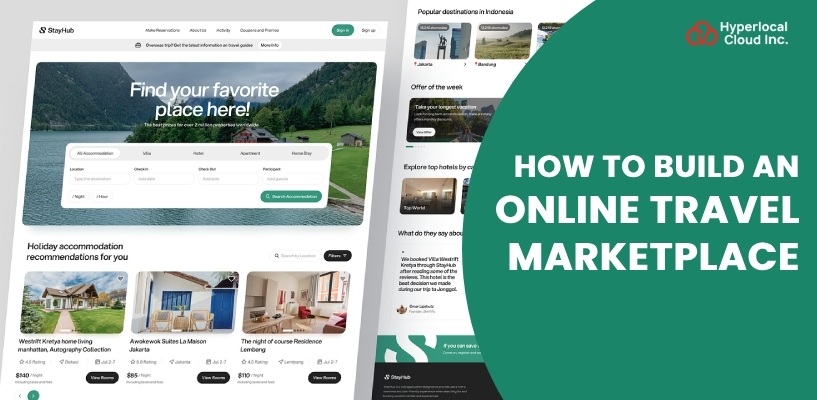How To Build An Online Travel Marketplace

The travel and hospitality industry has always remained an evergreen market for businesses worldwide. This is due to the availability of an online travel marketplace that has benefited everyone, be it end customers, businesses, or travel agencies.
Such platforms have made travelers independent, as they don’t require any third-party agency to plan their trip and make bookings on their behalf. Cost-effectiveness, convenience, time savings, and secure payments are key reasons these are in high demand.
According to reports, the online travel market is estimated to grow at a CAGR of 7% from 2024 to 2032. Also, by 2032, the market is anticipated to reach US$1.97 tn, which is spectacular. Looking at the trends, it’s an ideal time for businesses to invest in this industry and gain lucrative perks.
This blog will enlighten you about everything surrounding the online travel marketplace development. For more intricate details, stay tuned!
How Does Online Travel Marketplace Work?
Online travel marketplaces facilitate smooth journey planning and booking by providing an efficient link between users & service providers and enabling all the critical back-end operations. The user can search for travel options based on their preferences, such as destination, dates, budget, etc., along with various providers. When users find their perfect deal, they can book directly from the marketplace by filling in their personal details. After choosing their services, they can make the actual payment; the platform will process them securely through multiple payment methods. If there is a problem with their bookings, cancellations, or amendments, then the user can easily get in touch with support for these bookings.
Launch Your Online Travel Marketplace
Top Online Travel Marketplaces That Have Captured The Market
Expedia
Build an app like Expedia that offers travelers a wide array of services through hotel and travel domains at affordable prices. With a seamless interface, the booking experience becomes convenient and worthwhile.
Vrbo
Develop an app like Vrbo with unique features and design and a streamlined set of planning tools. The platform lets your customers have a phenomenal time with their family and friends.
Airbnb
Build an app like Airbnb and revolutionize travel and hospitality. The platform allows individuals to rent their properties at prices according to their choices.
Salient Features Of Travel Marketplace Platform
For Travel Agencies
Dashboard: A user-friendly interface allows travel agencies to manage their bookings, customer interactions, and analytics in one centralized platform, simplifying operations and enhancing efficiency.
Listing Management: The agencies can update and manage their listings in real-time, ensuring that customers get the latest available prices for flights and hotels.
Multi-Payment Options: Secure and diverse payment options enable smooth transactions, allowing agencies to handle various customers’ preferences while maintaining safety and compliance.
Multimodal Marketing Support: Helps agencies boost their services by promoting them across various channels to reach more customers and increase visibility.
Advanced Analytics: Helps to view customer behavior, sales trends, and marketing effectiveness and make informed decisions to optimize strategies and profitability.
For Businesses
Partnership Collaborations: Enables businesses to collaborate with different travel agencies and service operators, increasing the pool of offers for clients in terms of attractive package deals and amplifying bookings.
Dynamic Pricing Models: Allow businesses to change prices according to their requirements. Prices are differentiated according to demand, seasonal changes, and level of competition.
Performance Analytics: With this feature, customer engagement, booking trends, and fluctuations in market trends are analyzed. Tracking these things helps refine services and optimize marketing approaches to achieve the best outcome and increase customer satisfaction.
Feedback Integration: Helps to observe customers’ reactions by pointing out the pitfalls that will improve the service based on actual user experience.
For Customers
Comparison Attribute: Allows customers to compare prices, reviews, and amenities to avail themselves of the best services.
Personalization: With AI algorithms, customers can get recommendations tailored to individual tastes, elevating the traveling experience.
Streamlined Booking Experience: Provides users with an intuitive experience and makes booking flights and accommodations easy with minimal effort.
Customer Support: Enables customers to raise their concerns with the admin through this attribute and achieve greater satisfaction levels.
Do You Need to Build A Custom Travel Marketplace
Steps to Build An Online Travel Marketplace Process
Market Research
Market research is the foundation of a thriving online marketplace for travel. It’s about aiming and gathering information about demographics, preferences, and pain points by conducting surveys and focus groups, thereby analyzing what already exists. It also includes understanding the competition, their strengths and weaknesses, pricing strategies, customer reviews, etc.
We analyze what’s currently trending in traveling: new destinations, perhaps, or new ways of traveling under the influence of technology. This information forms the basis of your marketplace’s USP. Knowing all this information will result in further decision-making that will narrow down to the type of solution the user requires. It will also help determine how the marketplace will differ from those already existing.
Business Model Type
Business models decide and define what keeps the marketplace running and profitable. Decide how the marketplace will generate revenue through commission fees, subscription-based services for the service providers, or advertising sponsorships. Services like bundled travel packages for flights, hotels, and activities could be packaged.
You must also consider customer segments and tailor your offerings based on groups of budget travelers, luxury seekers, or adventure enthusiasts. Design a transparent business model to guide your pricing strategies, partnerships, and marketing efforts to meet user and business needs.
Platform Design
Platform design is about intuitive, engaging, and aesthetically appealing user interfaces and user experiences.
- Use wireframes and prototypes to map the user journey, ensuring easy navigation and clear calls to action. Fully embrace responsive design for mobile users who frequently book travel via smartphones.
- Implement filters, comparison tools, and even user-generated content to make it more engaging.
- Ensure that the branding of the design runs consistently throughout it, like colors, fonts, or images.
- User testing is integral during this phase, where feedback gathered will be implemented iteratively before it even hits development.
Choosing Technology Stack
A top-performing application includes the right choice of technology stacks in terms of performance, scalability, and security. Begin with a front-end framework that will offer a dynamic user experience, such as React, and combine it with a good back-end framework that will take care of server-side logic, i.e., Node.js. The choice of the database might depend on data complexities, volume, and overall landscape, and it could be something like MongoDB.
Third-party APIs need to be integrated into the platform to enhance functionalities, such as payment processing, booking systems, etc. Security protocols, such as encryption and conformity to regulations, are ensured to safeguard user data and gain users’ trust.
Development
Development is the process of coding the marketplace based on established designs and technical specifications. Start with the back-end, implementing server logic, database integration, and API connections. Develop the front end concurrently, ensuring that it works seamlessly with services on the back end. The focus should be on creating a robust and efficient payment processing system integrated with multiple payment options to accommodate all users.
In addition, critical features like user authentication, booking management, and customer support need to be built into the system. The development team should consistently analyze the code and undergo testing to detect bugs at an early stage. Agile practices can be used to allow constant development and adhere to schedules through continuous feedback.
Testing
Testing is required to guarantee that the site is reliable, usable, and secure. Start at the basic level by testing individual components in unit testing for proper functionality. Further move on to integrate testing to ensure the interactions of all the elements. The functional test is then conducted to ascertain whether the platform satisfies specific requirements and behaves as expected in all scenarios.
User acceptance testing involves real users using the platform to get their thoughts on usability and functionality. Performance testing is done to check the speed and responsiveness of the platform under load conditions. Security testing is carried out to identify vulnerabilities. The QA team will fix all the bugs or issues during testing so that the platform offers a smooth user experience without too many glitches at launch time.
Launch
During this phase, the platform’s works are made public. At this point, social media campaigns to generate attention may be implemented; partnering with travel influencers and agencies would be feasible. Track engagement and performance closely through the initial days to address any problems that may arise.
Customer support will be provided by guiding new users and utilizing all available feedback. Ideas regarding user behavior will be collected to refine marketing strategies and optimize the platform accordingly.
Iterate
It’s the process of continuing to build and augment the online travel marketplace through user feedback and market trends. Monitor user behavior through analytics tools to identify areas of improvement in navigation, features, and content. Engage to elicit feedback by conducting surveys and interviews with users. This will outline the pain points and preferences.
This information will be implemented in the performance enhancements and new feature creations, focusing only on those that support user needs and complement company goals. Continuous iteration helps the platform remain current, friendly, and competitive in the changing travel marketplace.
Want to know the cost of your project?
What Are The Benefits Of Online Travel Marketplace Development?
Travel Agencies
Travel agencies can attract the attention of a wider variety of users worldwide, thereby increasing their customer volume. The online travel marketplace simplifies operations like booking management, customer questions, and payments within one platform. With access to multiple suppliers, the agency can offer customers more services, including flights, hotels, and tours. In addition, reporting and analytics tools can help agencies understand client preferences and market trends.
For Customers
The platform is a single-stop facility for clients to analyze prices/services and review different providers. It offers the utmost level of transparency, including access to customer reviews and ratings that simplify the process. One of the most significant advantages for customers is customized travel arrangements that meet individual needs. They also tend to get better deals and discounts and can access the services anytime, making booking and managing trips easier.
For Businesses
Businesses can list their services on pages that more people visit, thereby increasing their chances of having more customers. The online rental marketplace has spectacular customer engagement that helps build massive brand loyalty. The availability of valuable customer data helps create workable business strategies and service offerings.
How Much Does It Cost To Build A Travel Marketplace Platform?
Online travel marketplace development costs start at $10k, depending on the level of customization. Check out the factors influencing the cost;
- Latest tech stacks
- Integrated features
- App complexity
- Location of the developers
- UI/UX design
- Size of the development firm
- Development process
Schedule a meeting with our experts and get started with your development journey!
Why Hire Hyperlocal For Your Online Travel Marketplace Development?
Hyperlocal is a leading marketplace development company offering top-notch services to its clients. Hire our vetted developers and build bug-free, user-friendly platforms. The following points give us a competitive edge over our competitors.
- Top-Level Expertise
- Dedicated Team
- Quality Services
- On-Time Product Delivery
- Outstanding Communication Skills
- Free One-Time Consultation
- 24*7 Technical Support
Talk to us today and develop a fully functional and feature-rich platform.





